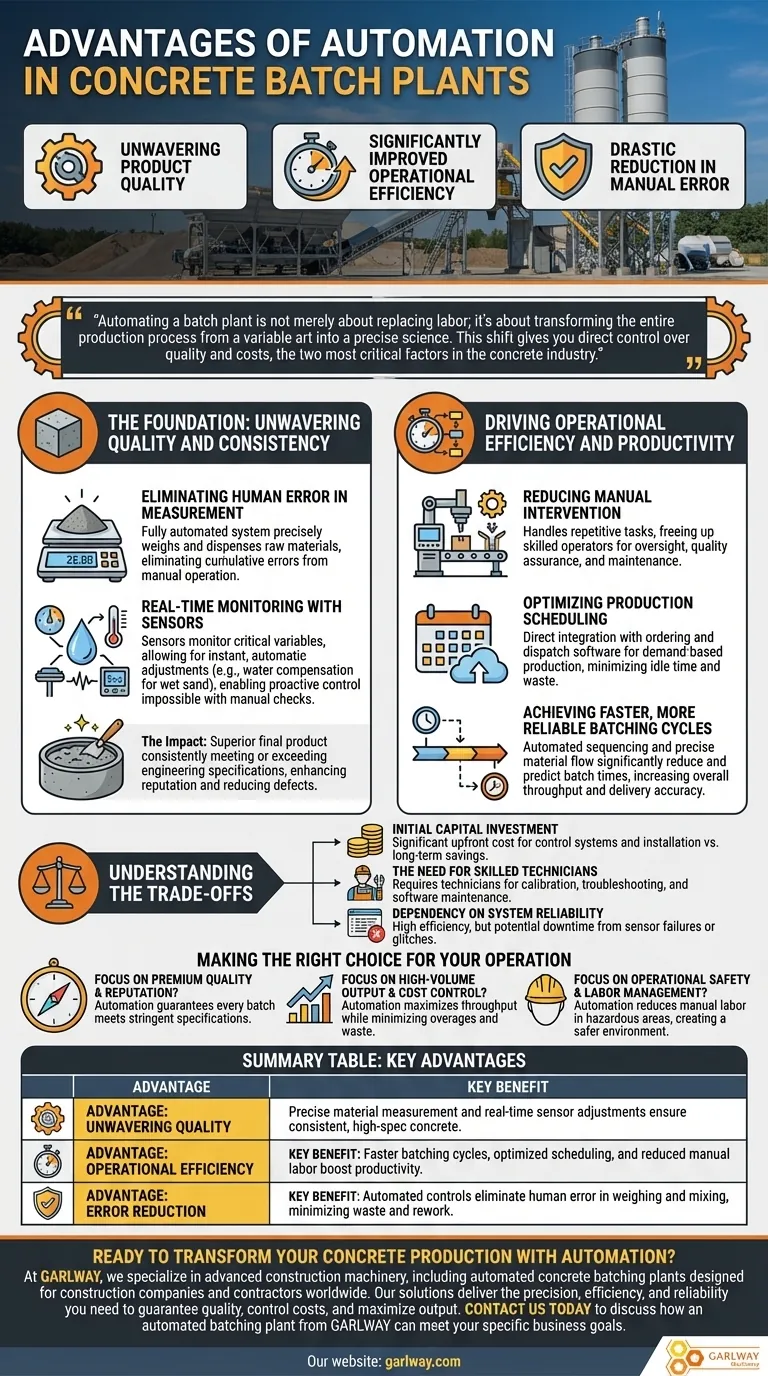At its core, automation in a concrete batch plant delivers three primary advantages: unwavering product quality, significantly improved operational efficiency, and a drastic reduction in manual error. By integrating sensors, real-time monitoring, and automated controls, plants can produce highly consistent concrete at a much faster and more predictable rate.
Automating a batch plant is not merely about replacing labor; it's about transforming the entire production process from a variable art into a precise science. This shift gives you direct control over quality and costs, the two most critical factors in the concrete industry.

The Foundation: Unwavering Quality and Consistency
The single greatest advantage of automation is the ability to guarantee quality batch after batch. This removes the guesswork and variability inherent in manual operations.
Eliminating Human Error in Measurement
A fully automated system precisely weighs and dispenses every raw material—aggregates, cement, water, and admixtures—according to the specified mix design. This digital precision eliminates the small but cumulative errors common with manual gate and valve operation.
Real-Time Monitoring with Sensors
Sensors are the nervous system of an automated plant. They constantly monitor critical variables like aggregate moisture content and batch temperature.
The system uses this data to make instant, automatic adjustments, such as reducing the amount of water added to compensate for wet sand. This proactive control is impossible to achieve with manual checks alone.
The Impact on Final Product Integrity
This level of control ensures that every batch has the correct water-to-cement ratio and consistency. The result is a superior final product that consistently meets or exceeds engineering specifications, enhancing your reputation and reducing the risk of costly defects.
Driving Operational Efficiency and Productivity
Beyond quality, automation streamlines the entire workflow of the plant, converting inputs into outputs with minimal waste.
Reducing Manual Intervention
Automation handles the repetitive and labor-intensive tasks of batching. This frees up skilled operators to focus on oversight, quality assurance, and maintenance rather than pulling levers and watching scales.
Optimizing Production Scheduling
Modern automated systems can integrate directly with ordering and dispatch software. This allows for demand-based production scheduling, ensuring the plant produces exactly what is needed, precisely when it is needed, minimizing idle time and waste.
Achieving Faster, More Reliable Batching Cycles
With automated sequencing and precise material flow, the time required to produce a single batch is significantly reduced and, more importantly, becomes highly predictable. This increases the plant's overall throughput and allows for more accurate delivery scheduling.
Understanding the Trade-offs
While the benefits are substantial, a clear-eyed view of the associated considerations is essential for making an informed decision.
The Initial Capital Investment
The primary barrier to automation is the significant upfront cost of control systems, sensors, and installation. This investment must be weighed against the long-term savings in labor, material waste, and quality-related rework.
The Need for Skilled Technicians
An automated plant trades manual labor for technical skill. You will require technicians who can calibrate sensors, troubleshoot control systems, and perform software maintenance, which represents a different type of staffing challenge.
Dependency on System Reliability
When the automated system is running, it is incredibly efficient. However, any downtime due to a sensor failure or software glitch can halt production entirely until a qualified technician can resolve the issue.
Making the Right Choice for Your Operation
Ultimately, the decision to automate should be driven by your specific business goals.
- If your primary focus is premium quality and reputation: Automation is non-negotiable for guaranteeing that every batch meets stringent engineering specifications.
- If your primary focus is high-volume output and cost control: Automation maximizes plant throughput while minimizing material overages and wasted batches.
- If your primary focus is operational safety and labor management: Automation reduces the need for manual labor in potentially hazardous areas and creates a more controlled, predictable work environment.
By moving to an automated system, you are fundamentally investing in certainty and control over your entire production process.
Summary Table:
| Advantage | Key Benefit |
|---|---|
| Unwavering Quality | Precise material measurement and real-time sensor adjustments ensure consistent, high-spec concrete. |
| Operational Efficiency | Faster batching cycles, optimized scheduling, and reduced manual labor boost productivity. |
| Error Reduction | Automated controls eliminate human error in weighing and mixing, minimizing waste and rework. |
Ready to transform your concrete production with automation?
At GARLWAY, we specialize in advanced construction machinery, including automated concrete batching plants designed for construction companies and contractors worldwide. Our solutions deliver the precision, efficiency, and reliability you need to guarantee quality, control costs, and maximize output.
Contact us today to discuss how an automated batching plant from GARLWAY can meet your specific business goals.
Visual Guide

Related Products
- HZS35 Small Cement Concrete Mixing Batch Plant
- HZS180 Ready Mix Concrete Plant for Foundations with Sand and Cement
- HZS75 Concrete Batching Plant Cement Mixer Price Concrete Mixer Bunnings Mixing Plant
- JW1000 Mobile Cement Mixer Concrete Mixer Truck and Batching Plant
- HZS120 Ready Mix Concrete Batching Plant Commercial Mud Cement Mixer
People Also Ask
- How do concrete mixing plant containers improve quality control? Achieve Precise, Automated Batching
- How does the aggregate weigh hopper contribute to the batching process? Achieve Precise Concrete Mixes
- What should be done during the no-load operation of a concrete mixing plant? A Step-by-Step Safety & Performance Guide
- What is the function of the control system in a concrete batching plant? Master Quality, Efficiency, and Cost Control
- What are the advantages of belt conveying for aggregates? Boost Efficiency & Reliability for Your Construction Site
- What are the factors influencing choice of a concrete mixing plant? Key Considerations for Efficiency
- How does ready-mix work? A Guide to Efficient, High-Quality Concrete Delivery
- What are the advantages of a central mix plant? Achieve Superior Quality & Speed














